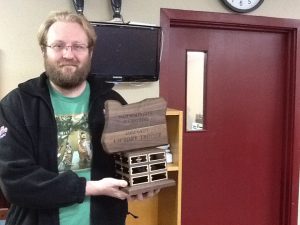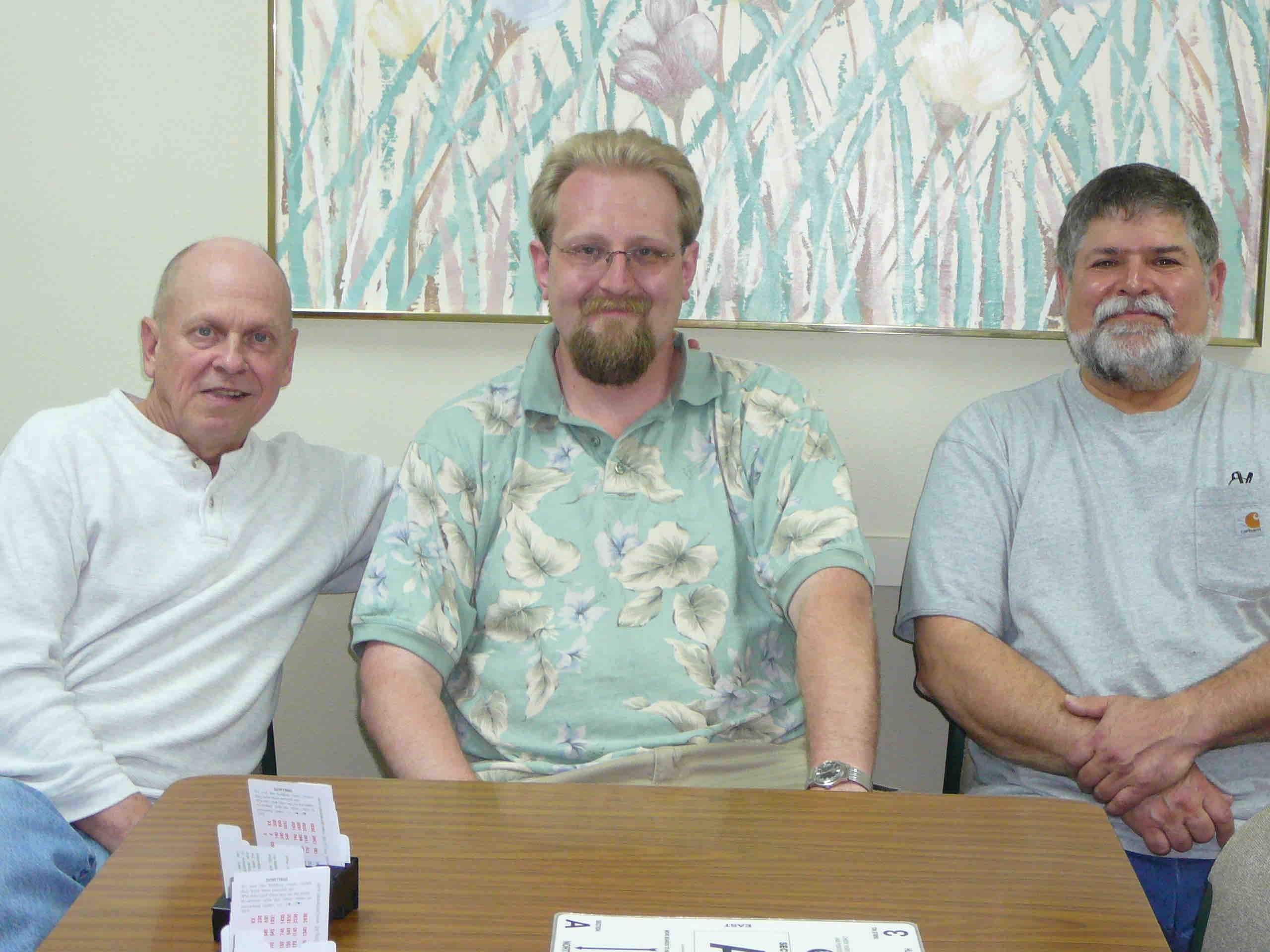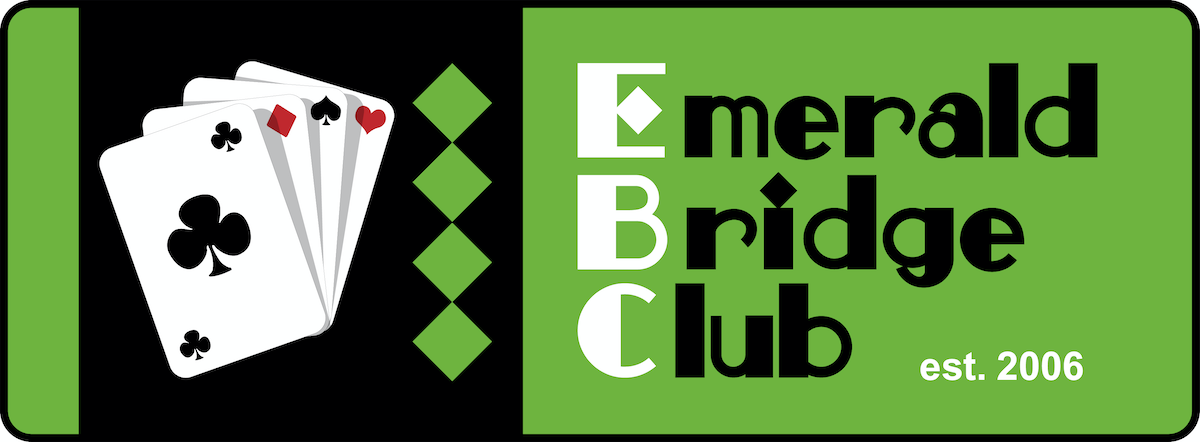
Holding trophy honoring Dan Voorhis.
Article Don recently wrote for The Trumpet.
To describe McKenzie Eugene Myer’s story as “Local Boy Makes Good” would be a little like describing 7NT X & XX making as a good result. It is not hyperbolic to describe what Mac has accomplished as unprecedented. He has achieved success at the highest level as a player, playing professional, educator/teacher, and national level director.
It all began when Mac received a copy of Eddie Kantar’s Bridge for Dummies for his 21th birthday in 2000 from his father Chris. Mac was not a bridge dummy for very long.
He took to the game like an over-bidder to a phantom sacrifice. He started playing online and soon saw that he was one of the better players on now defunct sites like Playsite & MSN Games. Locally, he found a home at the Emerald Bridge Club. His job called for lots of travel that afforded him the opportunity to play at many clubs with many partners. “For a couple of years, I averaged at least eight hours a day of bridge activities, if you include playing live, reading, and practicing online. I’m sure it wasn’t healthy, but it sure was a good way to get good at the game.”
By 2002, Mac’s game began to elevate to the next level. In what would become a transformative experience for him, he and Darius Jackson won the D20 Flight C North American Pairs. This earned them a trip to the 2003 NABC tournament in Philadelphia. As Mac describes it, “We did no damage there.” However, it did open his eyes to how much fun high-level bridge could be.
2003 also was the year he was invited to be a member of the U.S. Junior National Team, which was coached by Jade Barrett. He and his partner (and current ACBL colleague) Tim Crank took first place at the Irish Bridge Union “Junior Friendship Cup” held in Dublin, squeaking past a strong Swedish team in the final match. In just three years, Mac had earned his Life Master rank, won the D20 Flight C NAP, and was a member of the winning U.S. Junior Team.
Did I mention that by this time he had also become quite accomplished as a bidding theoretician? Of his many accomplishments, one of his proudest was developing, along with Garth Yettick, a Big Club system, parts of which have been adopted by big-time players such as Joe Grue and Brad Moss. The 300-plus pages of system notes verify Mac’s self-appraisal as somewhat of a System Geek.
Mac’s appetite for attending the Nationals was now whetted, and he has missed only two since 2004. His early trips often had to be done on the cheap, which translated into sleeping in youth hostels, his vehicle, and even hotel stairwells! Yes, hotel stairwells. The good news for Mac was that beginning in 2005, he began his career as a playing professional which afforded the luxury of sleeping in a real bed each evening. Such luxury.
2006 saw the emergence of Mac as a player on the world stage. He and D20’s Joel Datloff placed sixth in the World IMP Pairs in Verona, Italy. The pair was in second place after eight of the nine sessions in this grueling event. The disappointing finish in the finals taught Mac two very valuable lessons: that poor fortune can play a role in the outcome and that, despite the best of intentions, he sometimes does not play to the best of his ability. Still, a top ten finish in a world championship within a few years of taking up the game is, by any standard, a very, very impressive accomplishment.
2007 was another transformational year. To that point he had been supporting his bridge addiction by serving as a contract courier for Fed Ex. That company issued an ultimatum that he had to become a full-time employee or sever the relationship. The choice was clear. His income as a Playing Pro and from giving lessons was sufficient to allow Mac to embrace his first love and passion 24/7. He hasn’t looked back.
Playing with system co-creator Garth Yettick, Mac was part of the team that placed 2nd in the Mini-Spingold that was held at the Nationals in Washington, D.C. in 2009.
For a while, Mac focused more and more time on his career as a Playing Pro. He describes this experience as “interesting” in the way that interesting can cover a lot of territory. When I suggested that a book should be written about the experience of a Playing Pro, Mac said, using that word again, “That would be interesting. There would probably have to be a lot of names changed to protect the guilty.” He described his approach as not only trying to win, but also to educate. He added that “hogging” the contracts was not fun.
It was a natural evolution that Mac would get involved in the teaching part of the bridge world. He had always wanted to be a teacher. He especially was drawn to teaching his championship-level peers. He finds four-hour seminars the most fun and also the most work. As an attendee at more than a few of Mac’s presentations, I can attest to the quality of the experience. They are without equal. (Full disclosure: My wife Sherri and I are convinced that our 45 minutes of fame was hosting Mac’s first lesson in our living room.) Jerry Helms and Curtis Cheek are two teaching heroes for him.
For most mortals, all these accomplishments would constitute a remarkable career. McZen (Mac’s BBO handle) however is not most mortals. In many ways, every part of his bridge life was really prologue leading up to what would turn out to be his true calling and his real passion.
In 2008 the late (and by Mac’s description, “great”) National Tournament Director Millard Natchwey of D.C. asked if he wasn’t getting tired of “…teaching New Minor Forcing for the fiftieth time to little old ladies” and might he be interested in becoming a tournament director?
At that time, Mac was also beginning to tire of the lifestyle of the playing professional.
With encouragement from Millard as well as TDs Matt Smith and Charlie MacCracken, Mac became a TD for ACBL and found new intriguing challenges dealing with the problems of the Laws and of tournament logistics.
Mac’s phenomenal rise through the directing ranks in many ways surpasses his near meteoric rise as a player. He directed his first Sectional Tournament in Pocatello, ID (largest section was 15 tables) in 2011.
He started running bigger and bigger Sectionals, “…breaking 70 tables in Seattle.” (We assume he replaced all 70.) His first Regional was in LA in 2015 and he has been the DIC in more than a dozen Regionals in Districts all over the country.
In the fall of 2011, he was placed on the Tournament Services team, which handles the huge number of behind-the-scenes logistical issues at each of the NABCs. In 2013, the head position for this team came open, and Mac was the natural choice to fill it and held that post until 2019.
In 2013, he was given the ultimate compliment. He was the recipient of the Thomas Weeks Award, which is given to the Director who most exemplifies the qualities ACBL looks for and promotes in its directors. His peers voted for him for this award. There is no higher praise than to be recognized by one’s peers.
He was tapped in 2019 to replace the retiring Steve Bates as ACBL’s DIC for the Summer North American Bridge Championships (Nationals). His debut was at the Nationals in Las Vegas: the “challenge of my career,” he calls it.
Over the course of just nine years, Mac went from directing a small Sectional where 15 tables were the largest section, to be the DIC for the Summer Nationals in Las Vegas in 2020 where the largest section was 725 tables.
The ACBL mountaintop was reached this past February when Mac was promoted from Associate National Director to National Director.
But wait, there’s more. Mac is actively involved with the World Bridge Federation, which is the international governing body of contract bridge. The WBF is responsible for world championship competitions such as the Bermuda Bowl, Venice Cup, and Senior Bowl as well as the quadrennial World Team Olympiads. Mac’s role with this organization deserves telling and I plan to address it in a separate piece. It will come as no surprise that it is a good story.
Believe it or not, Mac has a life outside of bridge. A “quick bout with thyroid cancer in 2017 helped focus my priorities,” he says. “My career with the ACBL is very important to me and is something in which I take great pride—but work can’t be everything. At that point I started setting the job and the game aside when possible so I could spend more time with my real-life partner and wife Caitlin and my family.”
He describes himself as now living happily in west Eugene with Caitlin and their two dogs. Their shared passion is international travel—they honeymooned last year in Japan and Thailand and just got back from a great but frigid trip to Scotland. They are hoping to get to Uganda and Greece this year, although current circumstance may have something to say about that.
Mac is happy to report “I find the game even more fascinating than I did when I picked up the addiction twenty years ago.”
When I asked his mother Cindy to provide input, she was brief. “When he was born, we were living in Eugene and so we gave him Eugene as his middle name. When he was two, we moved to Turner, Oregon, and he asked us, ‘Is my name now Mac Turner?’’’ She says that was a hint that his brain was working in mysterious ways. Cindy says that he was reading at an eighth-grade level in kindergarten, so “…he was not a happy camper at school.” She adds that he loved bowling but gave it up when he found his true passion, bridge.
I have had the good fortune to watch Mac’s bridge journey almost from day one. His accomplishments, as charted above, are truly amazing and unprecedented. For me, however, the real story here is the person who is McKenzie Eugene Myers.
Fame and fortune (well, such as it is inside the ACBL world) have not altered who Mac is. He is today that same genuinely good person he was twenty years ago.
Here is a story from those early days. The Emerald Bridge Club was new and working with limited funds. Mac was just beginning to offer a few workshops that provided him a little bit of income. Mac gave EBC $1,000 from one of those early workshops just because he wanted to say “Thanks!” for the help he thought we had provided. (At that time, Jon Neimand was my partner in the running of EBC.) It did not matter that Mac had limited financial resources at that time. He did what he felt was the right thing to do. It is what he always does—the right thing.
His ethics are above reproach, of course. His graciousness at the table, whether as a player or a director, is a model for all of us. He is as good an ambassador as there could be for the game we all love
The bridge world got very lucky the day Mac’s dad gave him Eddie’s Bridge for Dummies though clearly Mr. Kantar’s title was a bit of a misnomer in this situation.
From an Older Article on the Website
Mac started showing up to play Bridge at Dave Butler’s Wednesday night game at the Garden Club on High Street in Eugene in the 2001. At that time, Mac was very much a part-time Bridge player and full-time courier for Fed. Ex.
Rumor has it that he took his first Bridge lesson from Jon and Don. Mac acknowledged that as true and also acknowledged he had to immediately unlearn everything he had been ‘taught.’
He became a Life Master and began playing professional Bridge as a junior in 2003. in 2009, he began to transition from Bridge player to tournament director and retired from playing in order to be able to direct full-time beginning in 2011. He makes occasional exceptions from his retirement to play with some of his favorite partners, but nowadays McKenzie prefers to manage and rule the game rather than play it.
He directs sectionals and regionals all over the northwestern US and western Canada. At the three yearly North American Championships, Mac leads the Tournament Services crew, responsible for set up and logistics for every event at the NABC.
In 2013, McKenzie was given the ultimate compliment. He was voted, by his peers, to be 2014’s recipient of the Thomas Weeks award. This award is given to the director who most exemplifies the qualities ACBL looks for and promotes in its directors.
We are also fortunate in that Mac, when his schedule permits, serves as the Tournament Director for our annual sectional. Mac’s presence is one of the reasons the sectional is always such a successful event.

Don Mac Jon
Link to the article featuring Mac winning the Thomas Weeks Award:
Here are McKenzie’s Five Best Bridge Tips. (The Five Best Tips Series is a feature we intend to add soon to the new site.)
- Read Mike Lawrence’s How to Read Your Opponents’ Cards. This is one of the best-written Bridge books out there. It is packed with useful information for players of all levels. If you’re only going to read one Bridge book in your life, this should be the one.
- Conventions are overrated. Too many players spend way too much time trying to learn obscure system gadgets without spending the time they should on just playing Bridge. You do not need conventions to win this game. For the ones you do choose to use, make sure you and your partner have thorough agreements; not just about the conventional bid, but all the follow-ups and inferences.
- Call the director when an irregularity occurs at your table. Many players know (or think they know) the ruling and do not want to trouble the directing staff with routine issues. Please do not think you are bothering us to call. It is our job!
- Be courteous..to your opponents, your partner, caddies, directors and everyone else you come across at a Bridge game. It is possible to be fiercely competitive and nice at the same time.
- Be courteous..it is important enough to list twice.


